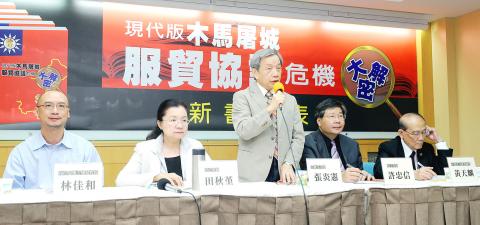|
Trade pact a ‘Trojan horse’: Taiwan
Society
By Chris Wang / Staff reporter

The Taiwan Society holds a press
conference in Taipei yesterday to launch a book about the cross-strait service
trade agreement.
Photo: Wang Min-wei, Taipei Times
The cross-strait service trade agreement
is part of President Ma Ying-jeou’s (馬英九) “triangle policy” toward eventual
unification with China and should not have been signed, a pro-independence
advocacy group said yesterday.
“We believe that the agreement, along with the ‘one China’ principle, and a
meeting between Ma and Chinese President Xi Jinping (習近平), form a triangle
policy of Ma’s goal of eventual unification,” former presidential advisor Huang
Tien-ling (黃天麟) wrote in a booklet published by the Taiwan Society.
A collection of several academic works, the booklet titled Crisis of the service
trade agreement — a modern-day Trojan horse was officially launched yesterday at
a press conference.
Breaking down the agreement into how it affects the economy, society, national
security, democracy and institutionalized negotiations, the authors conclude
that the pact is more of a political agreement than an economic one.
The cross-strait service trade agreement, which was signed in June, has touched
upon the core aspect of the nation’s industries under the common market
structure laid out in the Economic Cooperation Framework Agreement (ECFA) signed
in 2009, and it could further tie the nation’s economy to the Chinese economy
and have a devastating effect on small and medium-sized businesses, Huang said.
“Beijing’s strategy of reunification by trade is an open secret, which is why
discussion of the agreement without a political deliberation would be foolish,”
Huang said.
The agreement, which is due to be screened clause-by-clause in the legislature,
was controversial due to the opaque way it was signed and the scale of its
negative impacts on various local sectors of the service industry, in particular
banking, retail and agriculture.
Closer cross-strait banking integration could cause a financial crisis if loans
to Chinese end up as bad debts, National Taipei University professor Wang To-far
(王塗發) told the press conference.
Once the trade in goods agreement is signed by the end of this year, Chinese
investors would be able to dictate Taiwan’s retail market and integrate supply,
wholesale and retail, retired National Taiwan University professor Kenneth Lin
(林向愷) said.
The agricultural sector would face the same situation if the current ban on
certain Chinese agricultural products is lifted, Lin added.
|
![]()
![]()
![]()